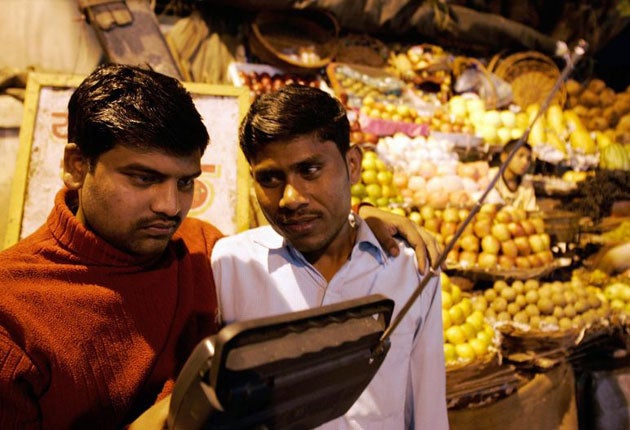Reduced BBC Hindi service will affect millions, critics say

Your support helps us to tell the story
From reproductive rights to climate change to Big Tech, The Independent is on the ground when the story is developing. Whether it's investigating the financials of Elon Musk's pro-Trump PAC or producing our latest documentary, 'The A Word', which shines a light on the American women fighting for reproductive rights, we know how important it is to parse out the facts from the messaging.
At such a critical moment in US history, we need reporters on the ground. Your donation allows us to keep sending journalists to speak to both sides of the story.
The Independent is trusted by Americans across the entire political spectrum. And unlike many other quality news outlets, we choose not to lock Americans out of our reporting and analysis with paywalls. We believe quality journalism should be available to everyone, paid for by those who can afford it.
Your support makes all the difference.BBC Hindi, the shortwave radio service that since 1940 has brought global news and current affairs to some of India's poorest and most remote regions, scaled back its transmission yesterday in a move that the author Vikram Seth said was contributing to "a great loss of goodwill and increase of mistrust in India".
The station, which broadcasts to more than 10 million listeners across the world's biggest democracy, was earmarked for closure as part of plans to shave 20 per cent from the World Service's £253m annual budget. It was granted a late reprieve only after a high-profile campaign by leading cultural figures.
As the one-year race to secure commercial funding begins, the station has reduced its output from four daily programmes to a single one-hour news broadcast. Should a plan not be found by next March, the station plans to cease transmission.
Yesterday leading figures called for the old programming schedule to be reinstated. Mr Seth said the new format was particularly damaging for "poor listeners for whom BBC Hindi on shortwave has been their only link to the wider world".
"Before listeners have given up or turned away, a morning programme should quickly be reinstated, and it should be affirmed in no uncertain terms that the BBC intends to keep its shortwave Hindi programmes going - not merely for a year," Mr Seth said.
Unlike Rupert Murdoch's Star Television, which has clawed its way into millions of middle-class Indian homes, BBC Hindi has broad appeal, including poorer, aspiring communities. In fact, the majority of its listeners are from rural areas such as Bihar, Uttar Pradesh and Jharkhand. Pawan Kumar Gupta, a 29-year old teacher in Hindaun, Rajasthan, said the station had helped him with his university entrance exams. "The magic was in experts giving their opinions on everything from science to sports," he said in a telephone interview. "This is what makes it so good. We don't have a better medium here for knowledge."
BBC Hindi won its spurs in 1984 when it was the first to inform the country of the assassination of Indira Gandhi, hours before the state broadcasters were able to obtain official clearance.
The senior BJP leader Mukhtar Abbas Naqvi said the service "has a major impact in India's politics and is popular in rural areas".
Mark Tully, the BBC's long-time India correspondent, said the decision to drop to a one-hour programme was "evidence that Britain doesn't care very much about India".

Watch Apple TV+ free for 7 days
New subscribers only. £8.99/mo. after free trial. Plan auto-renews until cancelled

Watch Apple TV+ free for 7 days
New subscribers only. £8.99/mo. after free trial. Plan auto-renews until cancelled
"It's a mistake to think there is no market in the rural areas," he said. "This is exactly the opposite of what is being found in Indian business ... [which] is in fact concentrating on rural areas."
Yesterday Amit Baruah, the head of BBC Hindi, said he was confident that the station could make a "successful transition" into the digital and mobile market, regardless of whether or not it could secure commercial funding.
The silent airwaves
BBC Caribbean Broadcast in the region for seven decades – now off the air. The first show in 1939, Calling the West Indies, consisted of letters from soldiers to their families at home.
BBC Portuguese for Africa The station was axed last month, ending a service relied on by millions in five former Portuguese colonies.
BBC Mandarin Broadcast since 1941 – now off the air. Deemed particularly important after 1989's Tiananmen Square protests.
Join our commenting forum
Join thought-provoking conversations, follow other Independent readers and see their replies
Comments